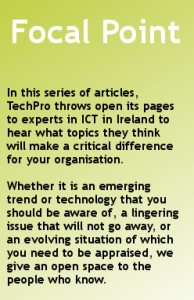We are living in times of unprecedented change at an economic, political and social level. In the business world, we are also experiencing huge transformations in the way we work and the technologies we now have at our disposal. Ricoh Ireland recently commissioned TechPro to carry out a survey of 135 IT professionals in Ireland to understand their challenges in this new world, with some interesting and revealing results.

Some 80% of respondents admitted that their organisations were under extreme or moderate pressure to implement new technologies due to work style-related disruption. This mirrors what we are seeing in the Irish marketplace.
Yet there is no such pressure on the Irish education sector to transform in the face of so much change. A couple of important questions remain unanswered for me. Firstly, what will happen when many thousands of jobs are lost in Ireland through increased levels of automation and computerisation? Secondly, do current teaching methods prepare our children for the speed of constantly changing technology that will soon be integrated into the reality of our everyday lives?”
For example, Daimler expects its self-driving 18-wheeler, now being tested in the Nevada Desert, to shortly be ready for the road. It is also estimated that Yellow Taxis, currently clogging the arterial routes of Manhattan, are estimated to see a 50% reduction in vehicle numbers and 100% reduction in drivers in the very near future. Has society provided an education which will enable the redundant operators of traditional trucks and cars to adapt and find work in today’s global information economy?
“Perhaps the greatest future threat to economic security could be that our entire education system, from primary school through to university, seems so focused on teaching skills that will soon be automated”
Steering away from the automotive industry most of us can now identify with the effect of document digitisation which continues to eliminate administrative positions in small and large businesses. Even jobs in finance, law and medicine don’t offer the steady career paths they once did. Perhaps the greatest future threat to economic security could be that our entire education system, from primary school through to university, seems so focused on teaching skills that will soon be automated.
In the same way that universal secondary schools started at the beginning of the 19th Century driven by the move from farm to factory. Subsequently the move from factory to office in the 1960s and 1970s created a requirement for education after secondary school, and thus became a tipping point for third level college/University enrolment. Today the increasing use of Digital Technologies, Internet of Things (IOT) and developments in Artificial Intelligence (AI) has highlighted the need to fundamentally challenge not only what, but more importantly how we teach our children.
In recent years, governments have increased investments in ICT in schools but international surveys from authorities such as the OECD have found that digital technologies have not yet been fully been embraced and integrated into how we educate our children. Teachers do not feel sufficiently skilled to use ICT effectively and a simple example of this is can be seen in the use of Interactive White Boards as expensive projectors or replacement black boards.
If we are to develop our society and make it ready for the exciting future that undoubtedly lies ahead, I believe now is the time to bring together all relevant stakeholders including teachers, lecturers, industry leaders and the Education Minister to start a dialogue on policies and strategy to nurture the right set of skills. This will enable more critical thinking, creativity and imagination that can be fully realised through innovative and relevant new teaching practices.
Gary Hopwood is general manager of Ricoh Ireland








Subscribers 0
Fans 0
Followers 0
Followers